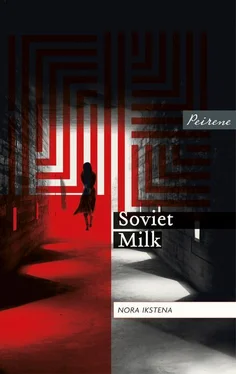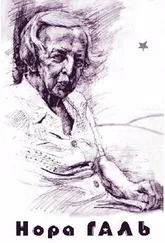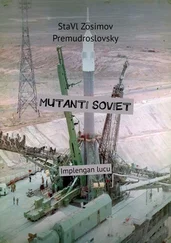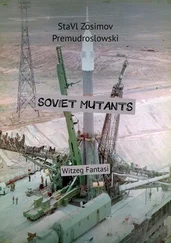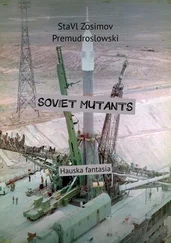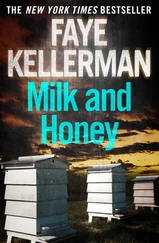In spite of the historical impossibility, there was something of the flower child in my mother. She wasn’t afraid of experimenting with herself and spent periods in a haze – whether through the use of some substance or thanks to her refusal to countenance the place and time in which she was fated to be alive. I remember her once, drunk on wine and high in a field of dandelions by the hippodrome, where the horses no longer raced. For her the hippodrome was evidence of some other, carefree and unfettered life. She ran through the dandelions like a young mare, and I skipped alongside getting under her feet. Out of breath, she lay down among the dandelions and I flopped down with her. There we lay, and the world had no limits.
*
I achieved my dream: the Riga Medical Institute accepted me. Officials there clung to the pre-war tradition by which doctors all came from Jewish families. Newcomers found it hard to break in. But I was difficult to stop.
On the kitchen table stood an unknown departed’s skull, which my stepfather had dug up in an abandoned country graveyard and steeped in various liquids until it had achieved a bluish-white sheen. Morning and night, eye to eye with the skull, I recited my Lord’s Prayer of bones in Latvian and Latin: Spārnkauls – os sphenoidale, pakauša kauls – os occipitale, deniņu kauls – os temporale, paura kauls – os parietale, pieres kauls – os frontale, sietiņkauls – os ethmoidale, augšžokļa kauls – maxilla, vaiga kauls – os zygomaticum, aukslēju kauls – os palatinum, asaru kauls – os lacrimale, deguna kauls – os nasale, mēles kauls – os hyoideum…
My best friend was the anatomy lab’s Cadaver Mārtiņš, as he was known. For a measure of vodka he would let you into the locked rooms at night. He would fish the required body part out of the formalin tank for me. I could spend hours dissecting, preparing and sewing it up. To solve life’s puzzle you had to use death’s rebus as a guide.
An old professor noticed my diligence. He said that I had an unusual drive to unlock the body’s secrets for a young woman. Also that my mind was too clever and wouldn’t do me any good in the long run. He said I must learn to accept that the key to life or death did not lie in my hands. He insisted that there is something more than existence, something we may not mention. The old man had nothing to lose. One evening, finding me bent over a uterus in formalin, he asked, ‘Do you believe in God?’ This was hard to answer, given that all references to anything divine had been erased from printed materials under the Soviet regime.
‘I still haven’t had the opportunity to meet Him,’ I said.
*
I was seven or eight years old when I temporarily became nearly mute. It was a lovely autumn afternoon. A friend and I were collecting the leaves that were beginning to turn yellow around the hippodrome. From over the trees, the smell of burning grew pervasive. It didn’t seem suspicious because people often used to burn things in their gardens in the autumn.
But the smell became stronger and suddenly, through the hippodrome roof, enormous flames shot out. They leapt along the beautiful building with unbelievable speed, and soon human yells as well as ambulance and fire engine sirens could be heard. We stood as if turned to stone, gazing at this disastrous scene, our pockets full of leaves. My mother flew from one of the ambulances. Screaming, she rushed to the firemen, grabbed a pail, scooped up water from a marshy ditch and raced in the direction of the fire-riddled building. Crying miserably, I ran to be with her. The firefighters caught up with us among the stands in the main arena, just as the burning roof collapsed.
In the ambulance, they injected my mother with something to calm her. Stuttering, I struggled to say only one word. I remember that short journey from the burning hippodrome to our building so well. I led my mother by the hand. Staring blankly, she obediently came along with me. I continued to cry and to stammer that one word: ‘home’.
It was a real Walpurgis Night. The calming effect of the injection soon wore off and my mother spent the night demolishing her room. My grandmother locked me in the bathroom, while my step-grandfather tried to get into my mother’s room. ‘Butchers,’ she screamed, ‘butchers, butchers, butchers!’ My grandmother stood weeping at the glass door, pleading for her to be quiet. Then my mother began a long, wailing cry. Soon, worried neighbours were knocking on our door. Then all went silent. A silence that blended into the darkness of the bathroom, where I sat sobbing and still trying quietly to say the word ‘home’.
*
It was a lovely summer’s day in 1977. In the morning after night duty, the head doctor called me in. He said an opportunity had arisen to supplement my education in gynaecology and endocrinology in Leningrad. After the abattoir – as we called night duty in our jargon – with its ever-spinning wheel of births, caesarean sections, scheduled legal and spontaneous abortions, myomas, polyps and cysts – to go to Leningrad and concentrate on science seemed incredible. I had to go to Engels Street to apply and submit to a short interview. It was just a formality.
I was tempted by this antechamber of hell on Engels Street. Maybe I would be let into paradise; maybe I would have to pay for it in blood. I fortified myself with coffee and a caffeine ampoule. I headed past our building, where my stepfather was preparing breakfast while my mother braided my daughter’s hair for school. Past their life, where I didn’t fit, but inhabited it like a ghost from another world to whose mystery I was increasingly drawn.
Just a formality, the head doctor had said. I was going to the building in whose cellars four years before my birth, just as a formality, the newly formed Soviet regime in Latvia had slaughtered innocent people, and their blood had coursed away through specially constructed gutters to mingle with Riga’s waste water. The prisoners crowded into tiny airless rooms with naked bulbs overhead had waited either for death or to be deported to Siberia. Such were those times. Crimes against the regime were an everyday occurrence. I had to go through the formality of this circle of hell. Leningrad was waiting for me with its new scientific discoveries and free spirit, which oppressed Riga was not allowed.
Inside the Engels Street building an elegant gentleman in civilian clothes led me to his office.
‘You’re a very talented young doctor, but you have a complicated background. Make your replies to my questions brief and clear. Did you ever meet your father?’
‘No.’
‘Did you know he was a traitor to his country?’
‘No.’
‘If you had known, would you have contacted him?’
‘No.’
‘Did your mother ever talk to you about your brother?’
‘No.’
‘Did you know that he was engaged in spreading anti-Soviet propaganda in London?’
‘No.’
‘Did you ever want to meet him?’
‘No.’
‘What exactly did you mean by these words, which were said on — at — o’clock in the anatomy laboratory: “I still haven’t had the opportunity to meet him”? Who is this he?’
‘God.’
‘Do you believe in God?’
‘No.’
‘Thank you. We will notify your head doctor of our decision regarding your studies in Leningrad.’
In the afternoon the head doctor phoned to congratulate me on being given the opportunity to supplement my education in Leningrad. An hour later we had to rush to the hippodrome, which was consumed in blue flames. I managed to throw all sorts of ampoules into my bag. I was furious and determined to save the people. I know they injected me with a sedative. I don’t remember any more.
Читать дальше
